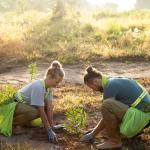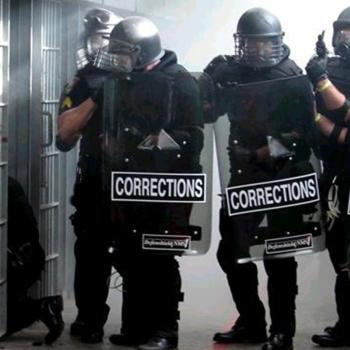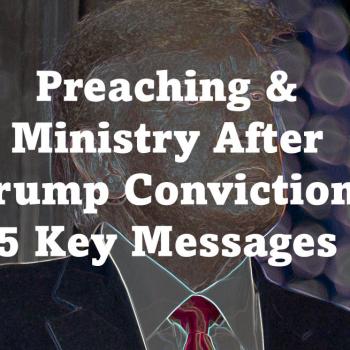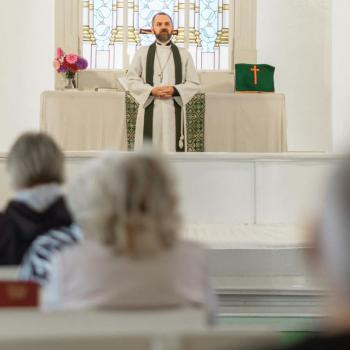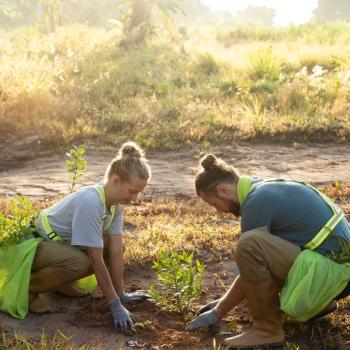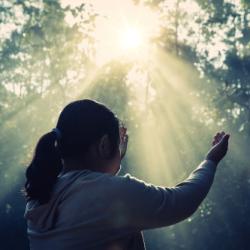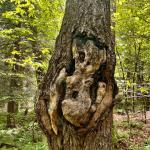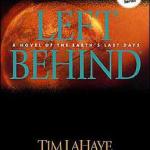Honoring the Sabbath for both people and Creation is an act of faith. It shows that we trust God by releasing our need for productivity and delighting in God’s world.
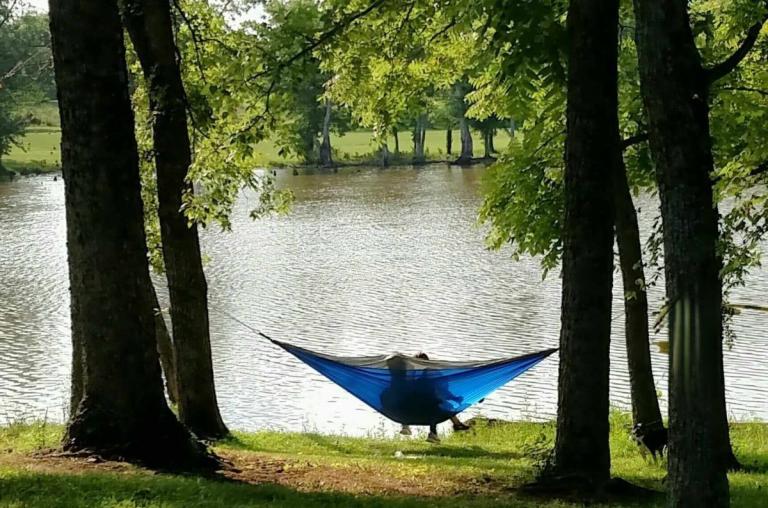
Here are ideas for teaching and preaching Deuteronomy 5:12-15 and Mark 2:23-3:6. These are readings assigned for the Second Sunday after Pentecost, Year B, in the Revised Common Lectionary, June 2, 2024. This is part of the EcoPreacher 1-2-3 series to equip preachers and congregations for engaging the Bible through an ecological lens.
Eco-Exegesis
Eco-exegesis is a method of interpreting the biblical text through a green lens using the principles of ecological theology. Learn more here.
Deut. 5:14: But the seventh day is a sabbath to the Lord your God; you shall not do any work—you, or your son or your daughter, or your male or female slave, or your ox or your donkey, or any of your livestock, or the resident alien in your towns, so that your male and female slave may rest as well as you.
What is Sabbath?
Sabbath is a day of religious observation and abstinence from work kept by Jews from Friday evening to Saturday evening and by Christians on Sunday. The commandment to rest and worship finds its roots in Genesis 2:2 where God rested from the act of creating the universe. God blessed every seventh day and made it sacred. In Exodus 20:8 and Deut. 5:14, the Sabbath is commanded by God to be kept as a holy day of rest.
Walter Brueggemann points out that Deuteronomy’s invocation of the community’s memory of slavery in Egypt “introduces a new motivation for Sabbath keeping, namely, exodus emancipation.”[i] He explains, “In Sabbath rest, the community publicly asserts that its life is not defined by production, consumption, and possession, but by the economic emancipation made possible by the lord of the exodus.”[ii]
Sabbath for the land and animals
In Eco Bible we learn that an ecotheological reading of expand the commandment’s relationship between humans and God to include humans, God, and the land. As Rabbi Dr. David Seidenberg explains, “For the Torah, our relationship to the land is the primary medium through which we enact our relationship to God.”[iii] Thus, with the Sabbath commandment, the land is given rest when humans refrain from work.
Further, the commandments extend to other creatures as well. One’s ox, donkey, and livestock are also released from work on the Sabbath. This shows that not only does God respect the needs of animals, but humans must do so as well. “How we relate to animals is part and parcel of how we relate to God. Animals are God’s creation, too, so we need to treat them respectfully.”[iv]
Jesus and the Sabbath
Mark 3:4: Then Jesus said to them, ‘Is it lawful to do good or to do harm on the sabbath, to save life or to kill?’ But they were silent.
The Sabbath is about freeing people from the relentless demand for work imposed on them by an extractive and exploitative empire. But when the commandment is used by those in power as a means of control it can result in hunger or physical suffering.
The religious leaders in Jesus’s time were weaponizing the Sabbath commandment so that it became the exact opposite of what God intended it to be. Jesus’s confrontation of the leaders revealed that while the wealthy have no need to secure food for themselves on the Sabbath, those who live hand-to-mouth have no such luxury.
When practices of unfairness are codified, a system of inequity becomes entrenched.
This was what Jesus was challenging – not the idea of the Sabbath, but the way the wealthy leaders had warped its interpretation in order to oppress the poor and sick.
The description of the religious leaders as having “hardness of heart” is a deliberate reference to another passage in Deuteronomy. In 15:7, God tells the Israelites, “Do not be hard-hearted or tight-fisted toward your needy neighbor.” Instead, they are to “give liberally and be ungrudging when you do so” (v. 10).
By allowing his disciples to glean on the Sabbath, and by healing the disfigured hand of the man in the synagogue, Jesus demonstrates the true fulfillment of the Sabbath. This is about relief from suffering and hunger, as well as restoration of community to those who have been ostracized.
Doing nothing is a spiritual practice of resistance.
Today, the challenge is not so much the correct interpretation of the commandment but an economy whose relentless demands make collective rest nearly impossible. Author Jenny Odell makes the case for “doing nothing” in radical resistance to our economy’s “arms race of urgency.”[v] Convenanting together as a congregation to create space for Sabbath is key to cultivating rest, restoration, and resistance to an oppressive economy.
1 Eco-Idea
The Eco-Idea is one succinct statement that tells us who God is and/or what God does in relation to Creation and how we should respond as people of faith.
Honoring the Sabbath for both people and Creation is an act of faith. It shows that we trust God by releasing our need for productivity and delighting in God’s world.
2 Eco-Questions
Eco-Questions are what we can ask to help a congregation draw out the implications of the Eco-Exegesis and Eco-Idea.
- What person do you know who best embodies a Sabbath-honoring life? How do they make you feel when you’re around them? What places in nature allow you to breathe and experience Sabbath moments? What can you learn from those places about healthy rhythms of activity and rest?
- In what ways does the church contribute to the busy-ness of our society? What could we shift so that it becomes a haven of rest for people?
3 Eco-Actions
Eco-Actions are ways that a congregation might respond to the Eco-Idea and Eco-Questions. One of these possibilities may have salience for your ministry context.
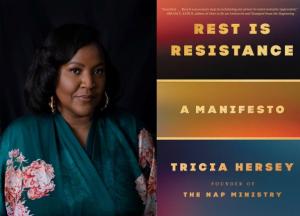
- Set aside times of dormancy, like the farmer allowing an overworked field to lie fallow for a season. Make space and time for sleep, daydreaming, doodling, walking, or listening to music. Think of this like an agricultural practice that allows nutrients to return to the soil, permits new growth to spring up, and shows respect for the land.
- Start a summer book study about the Sabbath. Some suggestions: How to Do Nothing: Resisting the Attention Economy by Jenny Odell (Melville House, 2019). Sabbath as Resistance: Saying No to the Culture of Now by Walter Brueggemann (Westminster John Knox, 2014). Rest is Resistance: A Manifesto by Tricia Hersey (Little, Brown Spark, 2022).
- Practice a “screen-free sabbath” for an hour or more a week (or day!) to give your brain a break from social media and the “arms race of urgency.”
Read also:
When Earth Demands Sabbath: Learning from the Coronavirus Pandemic
The Heart of the Earth: Jesus, Land, and Hope
Looking for ongoing support, resources, and colleagues as you preach about environmental issues?
The new EcoPreacher Cohort begins in September 2024! This is a monthly online gathering of preachers for learning and companionship to preach effectively in a climate-changed world. This is a Lilly Foundation-funded joint project of The BTS Center, Creation Justice Ministries, and Lexington Theological Seminary. To learn more click here.
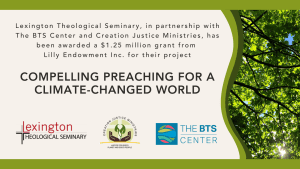
EcoPreacher 1-2-3 is a partnership between the Rev. Dr. Leah Schade and the Interfaith Center for Sustainable Development, publishers of Eco Bible, a Jewish ecological commentary on the Hebrew Scriptures. EcoPreacher 1-2-3 provides Creation-centered sermon preparation that is short, accessible, and based on a solid biblical foundation. To see other EcoPreacher ideas and to sign up to receive future EcoPreacher 1-2-3 installments, click here.

The Rev. Dr. Leah D. Schade is the Associate Professor of Preaching and Worship at Lexington Theological Seminary in Kentucky and ordained in the ELCA. Dr. Schade does not speak for LTS or the ELCA; her opinions are her own. She is the author of Preaching in the Purple Zone: Ministry in the Red-Blue Divide (Rowman & Littlefield, 2019) and Creation-Crisis Preaching: Ecology, Theology, and the Pulpit (Chalice Press, 2015). She is the co-editor of Rooted and Rising: Voices of Courage in a Time of Climate Crisis (Rowman & Littlefield, 2019). Her newest book is Introduction to Preaching: Scripture, Theology, and Sermon Preparation, co-authored with Jerry L. Sumney and Emily Askew (Rowman & Littlefield, 2023).
[i] Walter Brueggeman, Money and Possessions, Interpretation series (Louisville, KY: Westminster John Knox Press, 2016), 51.
[ii] Brueggeman, 51-52.
[iii] David Seidenberg, Kabbala and Ecology (Cambridge: Cambridge University Press, 2015), 166, citing Aldo Leopold, “The Land Ethic,” A Sand Country Almanac, ed. Aldo Leopold (Oxford: Oxford University Press, 1968), 237-261.
[iv] Rabbi Yonatan Neril and Rabbi Leo Dee, Eco Bible, Vol. 2: An Ecological Commentary on Leviticus, Numbers, and Deuteronomy, (The Interfaith Center for Sustainable Development, 2021), 137.
[v] Jenny Odell, How to Do Nothing: Resisting the Attention Economy (Melville House, 2019), 54.


